
People photo created by senivpetro – www.freepik.com
Unsure how to develop Content Marketing ideas? Wish to have some content idea hacks handy?
I know how it feels to be lost for words. It sucks—especially when you are under the pressure of an upcoming content marketing campaign deadline.
Thankfully, there are lots of ways to garner content ideas to get your content marketing factory running.
In this article, I will share 15 of the top tactics which you can use to stimulate your content marketing ideation efforts. Each of these sources for content ideas can be used for either Business to Consumer (B2C) or Business to Business (B2B) related trades.
Depending on your need and inclination, you can mix and match a few of them to see what works best for you.
Towards the end of the article, I share a simple process you can use to streamline the content marketing ideas which you’ve garnered, and to systematically put them into your content pipeline.
Ready for to give your content engine some rocket fuel? Let’s go!
#1 Use Google Autocomplete (and Questions)
Wish to know what content topics people are searching for related to your craft? Google it!
But don’t just click into the list of titles that the search engine presents to you. Instead, look at what it suggests (which is why its also called Google Suggests) as you type your keyword.
Like this example using Content Marketing as a keyword.

And this here is an example of the questions people are asking on Google.

Oh yes, I almost forgot that you should do so in Incognito or Private mode. This is to clear the cache that Google may have of your past searches.
#2 Search Book Titles on Amazon
If there is a bestselling book on your topic, you can bet that there will continue to be interest in that topic.
Using “Content Marketing” once again, I found these titles listed.
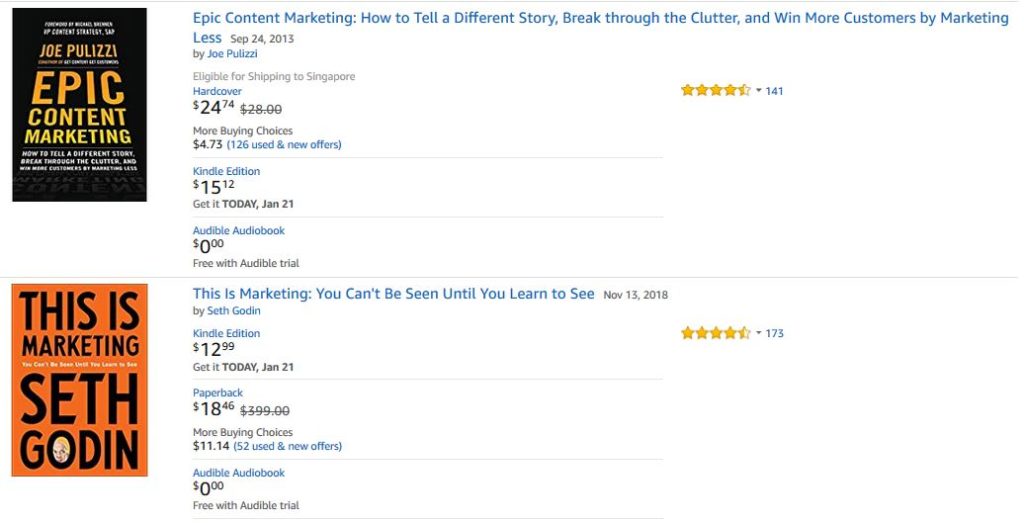
Clicking on the first title “Epic Content Marketing” by Joe Pulizzi, I found a description of the book, and this feature called “Look Inside” which is really useful as it’ll show you the content page of the book. From there, you can then choose your topics to write about.
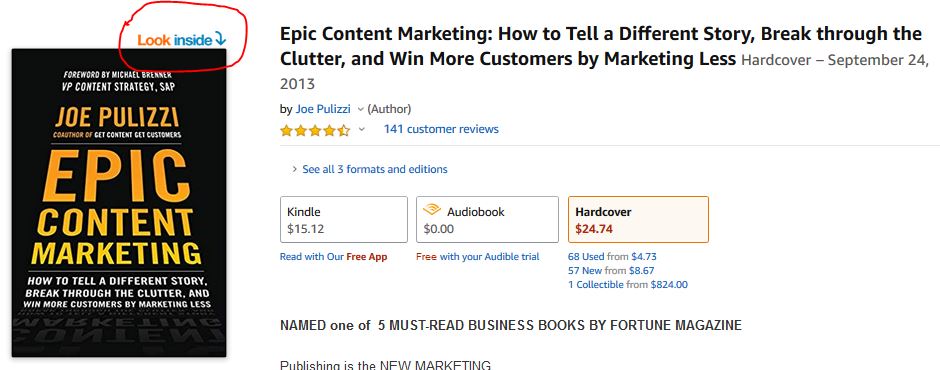
#3 Spy On Your Competitors
Sometimes, the best way to garner content ideas is to spy on what’s hot and happening in the scene. While there are plenty of tools that you can use to spy on your competitor’s top content ideas, here are two you can consider:
- Moz’s Link Explorer Use this to find out what the top pages of your competitors are, and see if you can create a piece of content that is better than theirs!
- BuzzSumo: Find out what the most shared content pieces related to your topic are, and see if you can adapt those ideas for your trade.
#4 Find Topics on Forums or Facebook Groups
Sometimes, the best ideas for content come from online forums that are related to your trade.
You can either visit your favourite industry or trade related forum, or use this tool called Boardreader to find out what topics people are discussing on.
If forums are difficult to digest, you can simply go into Facebook to find a Group related to your field, join them as a member, and peruse the posts that members are sharing.

#5 Query Quora
My son’s favourite website is Quora. As a random knowledge junkie with an interest in American politics, he uses it to probe his favourite subject.
Like him, you can also probe Quora to find useful and relevant topics that you can write about. For example, on “Content Marketing Ideas” like what I’ve done below.
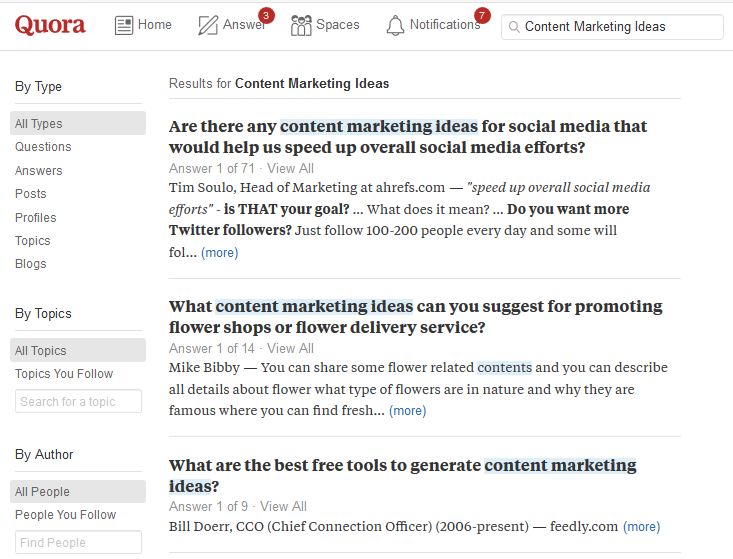
#6 Tap Google Trends
If you wish to ride on what’s trending on Google Search, you should use Google Trends as an ideation tool.
Here’s what I found on the date which I wrote this post.
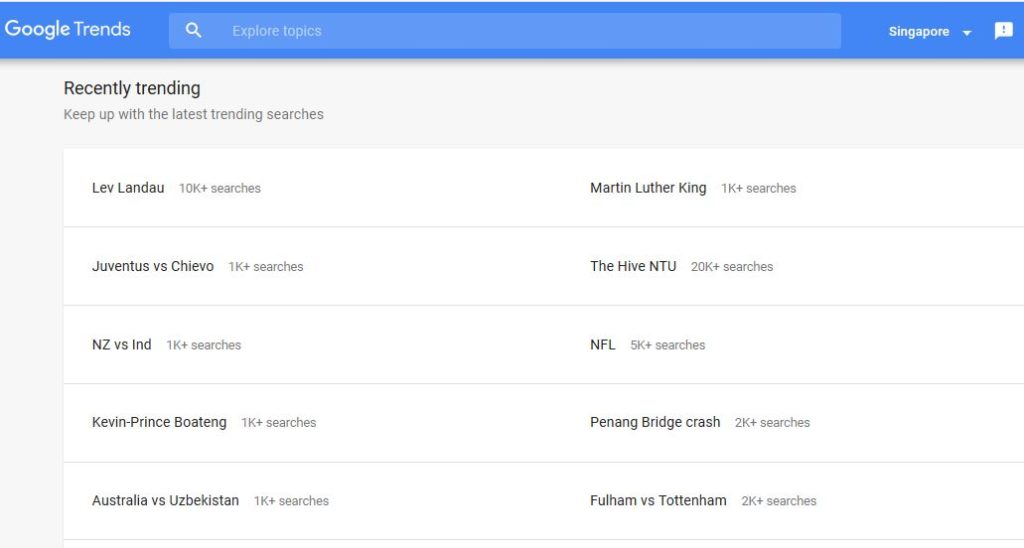
Using these topics, you can write a newsjacking post offering your perspective of a trending issue. Just be careful about offending sensitive feelings, and seek to be humorous rather than contentious.
#7 Search on YouTube
YouTube is a great treasure trove of content ideas, and it boasts of a wide range of topics that you can choose from.
The main difference is that the visual format of YouTube makes it easier to quickly scan and parse through possible topics that people are creating videos for.
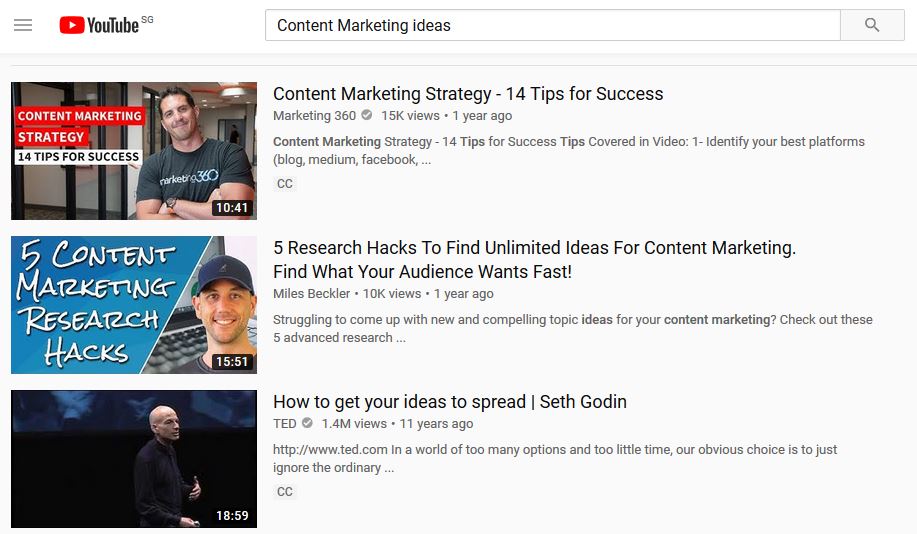
The neat thing about YouTube (which is owned by Google) is that it also offers suggestions (called YouTube Suggests) of what people are searching for. You can use it to create videos around a specific topic.
#8 Scroll Podcast Episodes
If you are a podcast listener (like I am), you can scroll through the most popular podcasts on your Apple or Google Podcasts app on your phone.
Search for the podcast episodes that are most relevant to your topic, and see if you can glean any ideas from there.
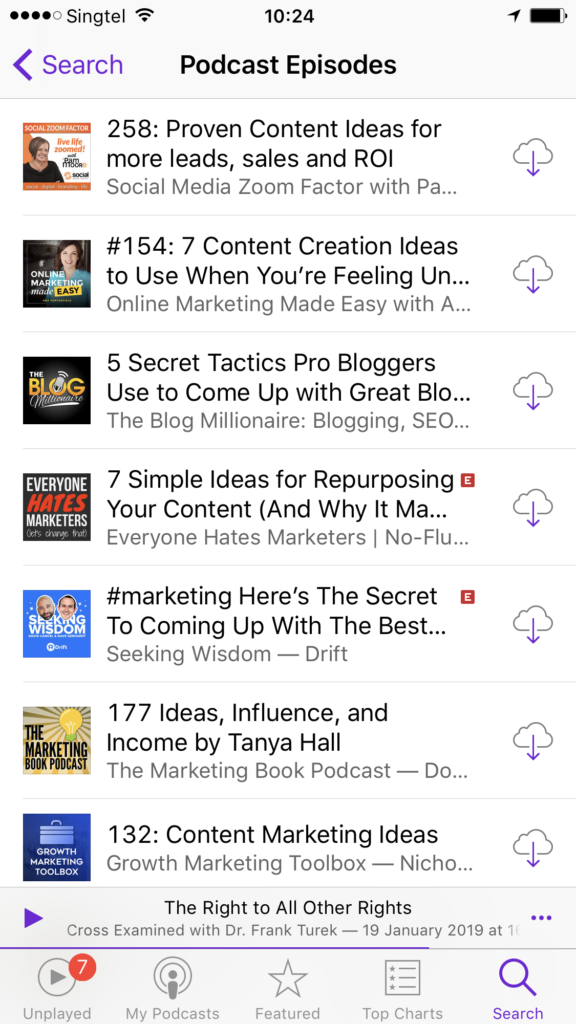
#9 Visit Content Aggregators
If you wish to catch a quick glance of what the top trending news articles are, you can use content or feed aggregators like AllTop and Feedly to show you what the most popular topics are.
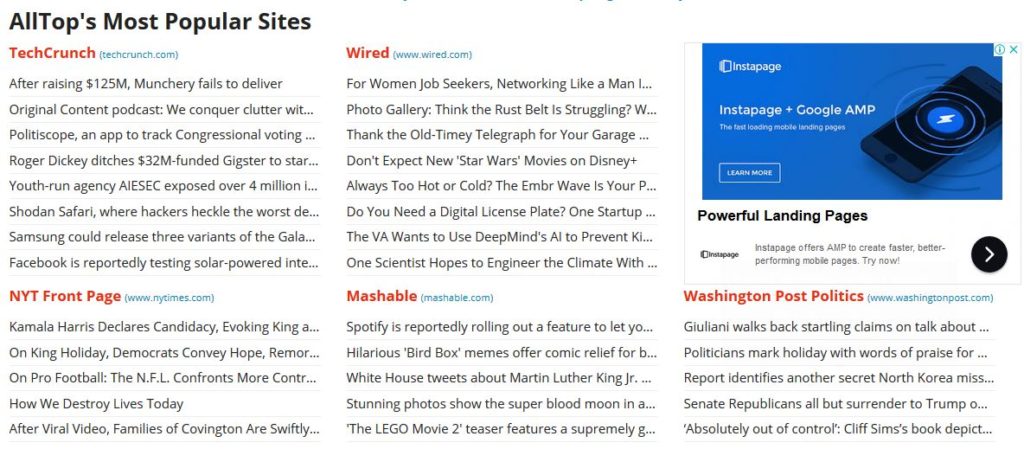
Unfortunately, these aggregators are pretty general and may not hone in on specific topics.
A better alternative could be reddit, considered the ‘front page of the Internet’ with its user-shared and voted topics. Here’s a selection based on Content Marketing Ideas.
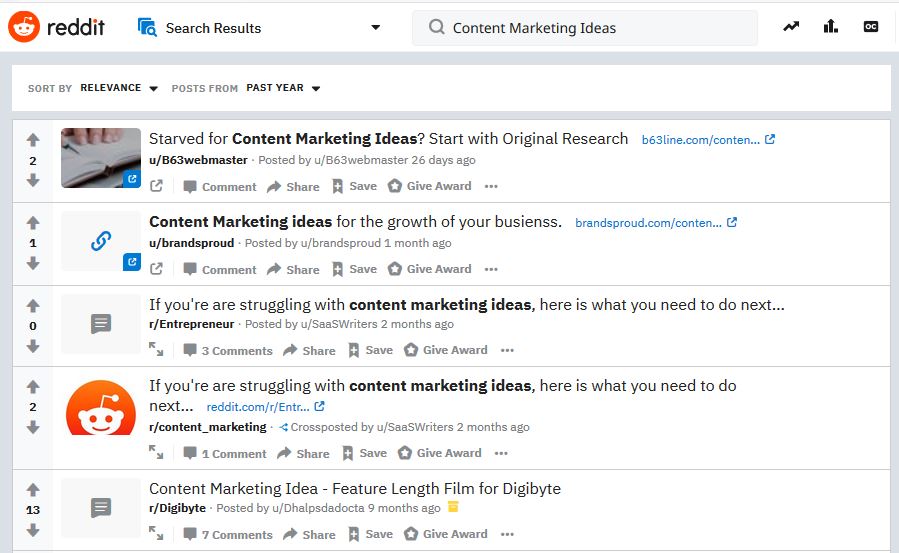
#10 Flip Magazines or Newspapers
Yeah, I know that this is old school, but it works for older folks like me.
Here are some reasons why I love to browse physical (paper) magazines:
- You can scan the headlines, images and texts quickly
- There is a higher chance of serendipitous discovery of content nuggets
- You can choose to zoom in or zoom out of topics quickly and easily
- It is less straining for your eyes
#11 Read Your Customer Complaints
I know I know. Nobody likes to learn about the areas which they suck.
But customer issues and complaints can often be the best place for you to start creating content that directly answers those pain points.
Doing so also helps you to improve your customer experience – a vital aspect of marketing in the digital age.
#12 Ask Your Customers
If reading negative feedback doesn’t spark joy or trigger your content flow, consider asking both potential and existing customers for content ideas.
There are several ways for you to do so:
- Post a question on Facebook, LinkedIn, or Twitter (“What topics would you like to learn about?”)
- Use an online survey tool like Survey Monkey
- Talk to your customers offline, either on the phone or via a chat app
#13 Use Idea Generator Tools
If you need a more wacky take on the topics that you should write about, do consider using online content idea generation tools. Most of them are available for free, and they can help to rustle up your rusty brain cells with some intriguing (and often ridiculous) content ideas.
Try these four for a start, and let me know which you prefer:
- Portent Content Idea Generator
- Hubspot Blog Topic Generator
- Build Your Own Blog’s Idea Generator
- The Content Strategy Helper
#14 Tap Search Keyword Tools
These are useful if you wish to dive into more details on the specific long tail keywords that your customers are searching for, and to rank for them on Google.
There are three that I would suggest.
- Google Ads Keyword Planner—This free tool from Google is used by Pay Per Click (PPC) specialists to generate the right keywords to bid for Search Engine ads, but you can use them to estimate search volume and competition (choose less competitive keywords) when you come up with content marketing ideas.
- Ubersuggest—Similar to Google Ads Keyword Planner, with the added advantage of combining the Google Suggest functionality for related keyword ideas.
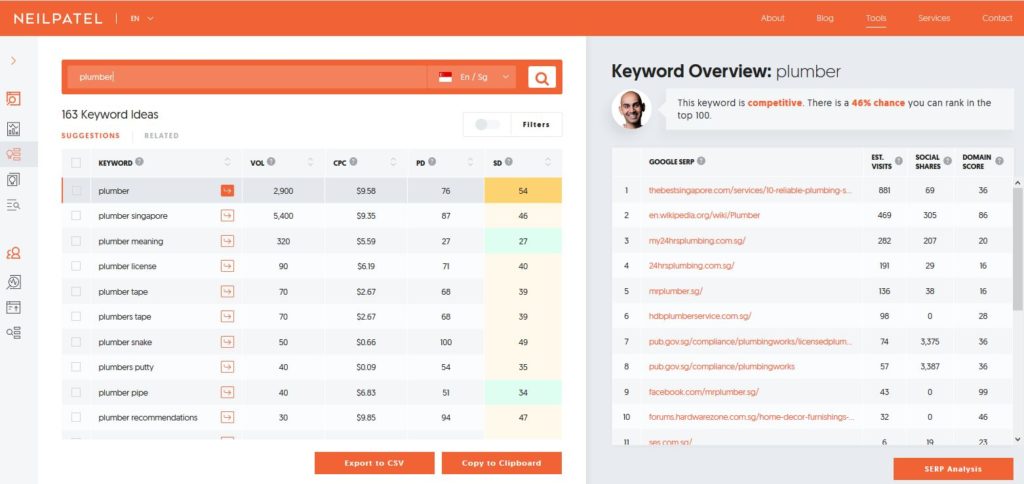
- Keyword Tool—The free version provides a list of potential long-tail keywords that your customer may be searching for, while the pro version allows you to see what their search volumes are. You can combine this with Ubersuggest or Keyword Planner to choose the best combination of keywords for your content.
#15 Peruse Pinterest
Finally, but certainly not lastly, consider stalking the various Boards on Pinterest.
What I love about Pinterest is that it provides a visually interesting way to navigate your content marketing ideas and choose the best one that you can use. Note that this doesn’t just apply to creating visual content—you can also mix and match these inputs to craft text, video, or audio content.
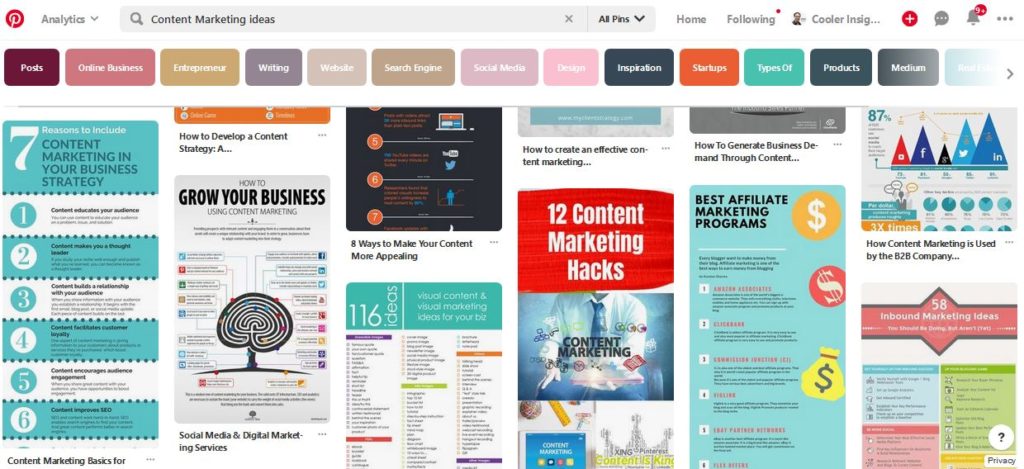
10 Steps To Using Your Content Ideas
Now that you’ve garnered a respectable pool of different content ideas, you need to translate them into actual content pieces.
Here’s a simple yet systematic step-by-step process that you can use.
- Jot: Write down your raw content marketing ideas, or cut and paste them into a document or file.
- Adapt: Modify them – add, subtract, mix it around, or change the subject.
- Categorise: Group or classify them into related themes/ topics.
- Rank: Rank them by impact/ originality. Start with the most impactful in descending order.
- Schedule: Plonk them into your content calendar, and assign duties.
- Plan: Before crafting the content pieces, create a skeletal outline.
- Write: Craft your content pieces.
- Publish: Use the right channel to publish them.
- Share: Once published, remember to share and promote your content pieces.
- Monitor: Track the outcomes of your different content marketing ideas and see which ones work better and which ones don’t.
Conclusion
Idea generation is one of the greatest challenges of content marketers everywhere. It is also the single greatest reasons for bloggers and other influencers to stop creating content online.
Using the 15 content ideation tactics plus the 10-step process for bringing these ideas to life, you can leapfrog over these challenges in your content marketing journey.
Are there other content ideation techniques that you’d suggest? I’d love to read your thoughts.
Need Help with Your Content Marketing?
Fill in the contact form below for a free 60-minute Skype or Zoom consultation session!

One Comment
Comments are closed.